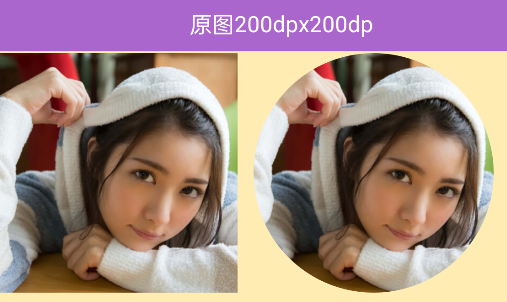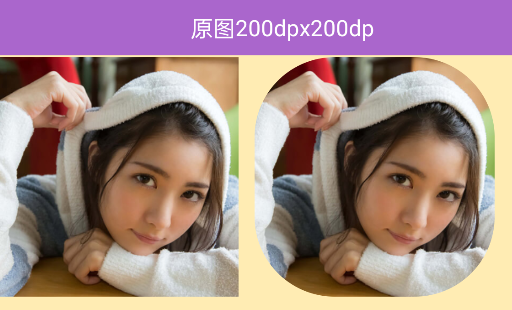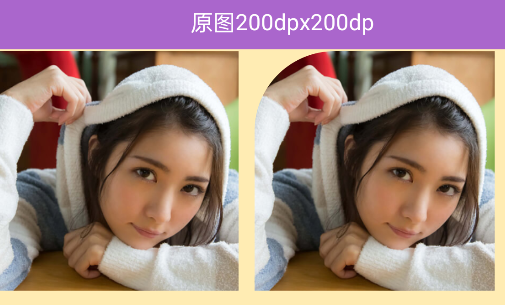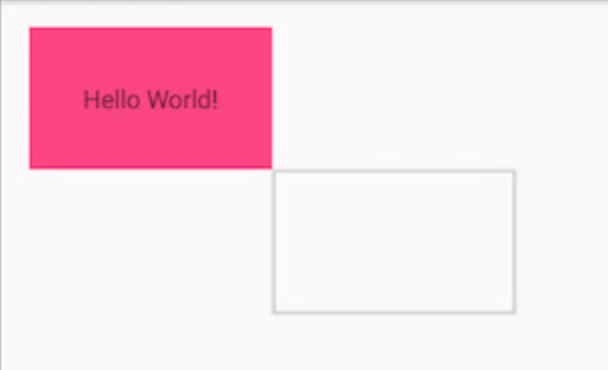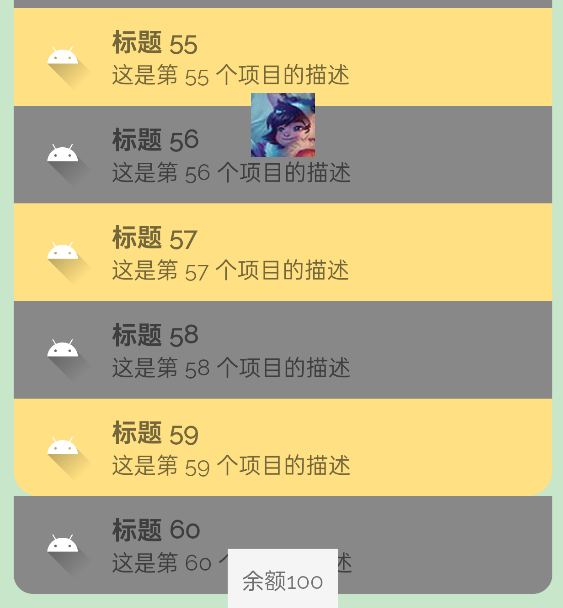Android实现圆角
Android 实现圆角
shape xml
1
2
3
4
5
6
7
8
<shape xmlns:android="http://schemas.android.com/apk/res/android">
<solid android:color="#ffffff" />
<stroke
android:width="0.8dp"
android:color="#ffffff" />
<corners android:radius="10dp" />
</shape>
其实这样的操作只不过是改变背景而已,它可能会出现内部内容穿透的效果。
View 使用 ViewOutlineProvider 裁剪制作圆角或者倒角 (API21 及以上)
ViewOutlineProvider 介绍
什么是 ViewOutlineProvider?
ViewOutlineProvider 是 Android 中用于定义视图(View)轮廓(Outline)的核心类,主要用于实现视图的形状裁剪(Clipping)和阴影(Elevation)效果。它是 Android 5.0(API 21)引入的图形渲染优化的一部分,能够在不修改视图内容的情况下,通过定义轮廓影响视图的显示边界和阴影形状。
Outline(轮廓): 表示一个视图的几何形状边界。可以是矩形、圆角矩形、圆形或自定义路径。
ViewOutlineProvider 分类
ViewOutlineProvider 内置三种默认的实现 BACKGROUND、BOUNDS、PADDED_BOUNDS:
BACKGROUND
BACKGROUND:使用视图的背景(Background)来确定轮廓边界 (如果视图没有背景,则轮廓将不会生效)。视图的背景可以是一个 Drawable,例如 ShapeDrawable 或 BitmapDrawable。轮廓会根据背景的形状进行调整。
适用场景:当你需要根据视图的背景来设置轮廓时,例如背景是一个圆形或椭圆形的 Drawable。
BOUNDS
BOUNDS:使用视图的边界(Bounds)来确定轮廓边界。轮廓会根据视图的宽高来设置,形成一个矩形轮廓。
适用场景:当你需要一个简单的矩形轮廓时,例如给一个普通的 View 添加圆角效果。
PADDED_BOUNDS
PADDED_BOUNDS:使用视图的边界加上内边距(Padding)来确定轮廓边界。轮廓会根据视图的宽高和内边距来设置,形成一个矩形轮廓。
适用场景:当你需要在视图的内边距之外添加轮廓时,例如给一个有内边距的 View 添加圆角效果。
ViewOutlineProvider (轮廓提供者的使用步骤)
- 自定义 ViewOutlineProvider,并重写 getOutline 方法来提取轮廓;
- 通过
view.setClipToOutline(true)方法来开启组件的裁剪功能; - 通过
view.setOutlineProvider(new MyViewOutlineProvider())方法设置自定义的轮廓提供者来完成裁剪。
API
getOutline(View view, Outline outline)
为视图生成轮廓。
view:需要设置轮廓的视图。outline:用于接收轮廓数据的对象。- 关键操作:
- 通过
outline的方法(如setRoundRect()、setOval()、setPath())定义形状。 - 必须确保视图的尺寸(
view.getWidth()和view.getHeight())已确定。
- 通过
setClipToOutline(boolean clip)
启用或禁用视图内容按轮廓裁剪。
- 限制:
- 仅对不透明背景的视图有效。
- 某些复杂轮廓(如路径)可能无法触发硬件加速裁剪。
ViewOutlineProvider 功能
setOval 圆形
1
2
3
4
5
6
7
8
9
10
11
fun setOvalClick(view: View) {
val viewOutlineProvider =
object : ViewOutlineProvider() {
override fun getOutline(view: View?, outline: Outline?) {
// 裁剪成一个圆形
outline?.setOval(0, 0, view!!.width, view.height)
}
}
imageview.outlineProvider = viewOutlineProvider
imageview.clipToOutline = !imageview.clipToOutline
}
setRoundRect 圆角
4 个圆角
1
2
3
4
5
6
7
8
9
10
11
fun setRoundRectClick(view: View) {
val viewOutlineProvider =
object : ViewOutlineProvider() {
override fun getOutline(view: View?, outline: Outline?) {
// 裁剪成一个圆角
outline?.setRoundRect(0, 0, view!!.width, view.height, 50F.dp)
}
}
imageview.outlineProvider = viewOutlineProvider
imageview.clipToOutline = !imageview.clipToOutline
}
效果:
top left 圆角
1
2
3
4
5
6
7
8
9
10
11
fun setRoundRectClickTopLeft(view: View) {
val viewOutlineProvider =
object : ViewOutlineProvider() {
override fun getOutline(view: View?, outline: Outline?) {
// 裁剪成一个圆角
outline?.setRoundRect(0, 0, view!!.width + 50.dp, view.height + 50.dp, 50F.dp)
}
}
imageview.outlineProvider = viewOutlineProvider
imageview.clipToOutline = !imageview.clipToOutline
}
效果:
为什么是 right 和 bottom + 50.dp?
这是因为要 setRoundRect 是一个矩形,向右和向下移动 50dp,画出来的刚好是左上角 radius=50dp 的圆角
setRect 裁剪
1
2
3
4
5
6
7
8
9
10
11
12
13
14
15
16
17
18
19
20
21
22
23
private var mViewRect: Rect? = null
fun setRectClick(view: View) {
if (Build.VERSION.SDK_INT >= Build.VERSION_CODES.LOLLIPOP) {
val viewOutlineProvider =
@RequiresApi(Build.VERSION_CODES.LOLLIPOP) object : ViewOutlineProvider() {
override fun getOutline(view: View?, outline: Outline?) {
if (mViewRect != null) {
outline?.setRect(mViewRect!!)
}
}
}
imageview.outlineProvider = viewOutlineProvider
imageview.clipToOutline = !imageview.clipToOutline
mViewRect = Rect(
imageview.width / 6,
imageview.height / 8,
imageview.width * 5 / 6,
imageview.height * 7 / 8
)
imageview.invalidateOutline() // API21
}
}
setPath 设置投影
1
2
3
4
5
6
7
8
9
10
11
12
13
14
15
view.setElevation(5);
view.setOutlineProvider(new ViewOutlineProvider() {
@Override
public void getOutline(View view, Outline outline) {
//你可以用 Path 指定任何的形状,前提是凸多边形
//这里设置投影的位置从右下角开始,投影形状是矩形
Path path = new Path();
path.moveTo(view.getWidth(), view.getHeight());
path.lineTo(view.getWidth(), view.getHeight() * 2);
path.lineTo(view.getWidth() * 2, view.getHeight() * 2);
path.lineTo(view.getWidth() * 2, view.getHeight());
path.close();
outline.setConvexPath(path); // Android30过期了,用setPath
}
});
OutlineProvider 圆角封装
1
2
3
4
5
6
7
8
9
10
11
12
13
14
15
16
17
18
19
20
21
22
23
24
25
26
27
28
29
30
31
32
33
34
35
36
37
38
39
40
41
42
43
44
45
46
47
48
49
50
class RoundedCornersOutlineProvider(
val radius: Float? = null,
private val topLeft: Float? = null,
private val topRight: Float? = null,
private val bottomLeft: Float? = null,
private val bottomRight: Float? = null,
) : ViewOutlineProvider() {
private val topCorners = topLeft != null && topLeft == topRight
private val rightCorners = topRight != null && topRight == bottomRight
private val bottomCorners = bottomLeft != null && bottomLeft == bottomRight
private val leftCorners = topLeft != null && topLeft == bottomLeft
private val topLeftCorner = topLeft != null
private val topRightCorner = topRight != null
private val bottomRightCorner = bottomRight != null
private val bottomLeftCorner = bottomLeft != null
override fun getOutline(view: View, outline: Outline) {
val left = 0
val top = 0
val right = view.width
val bottom = view.height
if (radius != null) {
val cornerRadius = radius //.typedValue(resources).toFloat()
outline.setRoundRect(left, top, right, bottom, cornerRadius)
} else {
val cornerRadius = topLeft ?: topRight ?: bottomLeft ?: bottomRight ?: 0F
when {
topCorners -> outline.setRoundRect(left, top, right, bottom + cornerRadius.toInt(), cornerRadius)
bottomCorners -> outline.setRoundRect(left, top - cornerRadius.toInt(), right, bottom, cornerRadius)
leftCorners -> outline.setRoundRect(left, top, right + cornerRadius.toInt(), bottom, cornerRadius)
rightCorners -> outline.setRoundRect(left - cornerRadius.toInt(), top, right, bottom, cornerRadius)
topLeftCorner -> outline.setRoundRect(
left, top, right + cornerRadius.toInt(), bottom + cornerRadius.toInt(), cornerRadius
)
bottomLeftCorner -> outline.setRoundRect(
left, top - cornerRadius.toInt(), right + cornerRadius.toInt(), bottom, cornerRadius
)
topRightCorner -> outline.setRoundRect(
left - cornerRadius.toInt(), top, right, bottom + cornerRadius.toInt(), cornerRadius
)
bottomRightCorner -> outline.setRoundRect(
left - cornerRadius.toInt(), top - cornerRadius.toInt(), right, bottom, cornerRadius
)
}
}
}
}
使用:
- RTL 使用
1
2
3
4
5
6
7
8
9
10
11
12
13
14
15
16
17
cardView.outlineProvider = if (DirectionHelper.isRtl()) {
RoundedCornersOutlineProvider(
corner,
rightTopCorner,
leftTopCorner,
rightBottomCorner,
leftBottomCorner
)
} else {
RoundedCornersOutlineProvider(
corner,
leftTopCorner,
rightTopCorner,
leftBottomCorner,
rightBottomCorner
)
}
- 四个圆角
1
2
3
4
view.outlineProvider = RoundedCornersOutlineProvider(
radiusPx = cornerRadius
)
view.clipToOutline = true
- 底部 2 个圆角
1
2
3
4
5
view.outlineProvider = RoundedCornersOutlineProvider(
bottomLeft = cornerRadius,
bottomRight = cornerRadius
)
view.clipToOutline = true
示例
setPath 裁剪圆角
示例: 裁剪 RecyclerView 倒数第 2 个 item 元素的底部 2 个圆角,上面不要裁剪
1
2
3
4
5
6
7
8
9
10
11
12
13
14
15
16
17
18
19
20
21
22
23
24
25
26
27
28
29
30
31
32
33
34
35
36
37
38
39
40
41
42
43
44
45
46
47
48
49
50
51
52
53
54
55
56
57
58
59
60
61
62
63
64
65
66
class SpecialBottomDecoration(
private val cornerRadius: Float = 12F.dp(),
private val bgColor: Int = ViewUtil.getColor(R.color.sui_color_black_alpha11)
) : RecyclerView.ItemDecoration() {
override fun onDraw(c: Canvas, parent: RecyclerView, state: RecyclerView.State) {
parent.forEachVisibleChild { view, position ->
if (isSecondLastItem(parent, view)) {
drawBottomRoundCornerRoundedCornersOutlineProvider(c, view)
}
}
}
val path = Path()
private fun drawBottomRoundCornerPath(c: Canvas, view: View) {
val radiusPx = cornerRadius
view.outlineProvider = object : ViewOutlineProvider() {
override fun getOutline(view: View, outline: Outline) {
path.moveTo(view.width.toFloat(), 0f)
path.moveTo(view.width.toFloat(), view.height.toFloat() - radiusPx)
// 右下角
path.arcTo(
view.width - cornerRadius * 2f,
view.height - cornerRadius * 2f,
view.width.toFloat(),
view.height.toFloat(),
0f,
90f,
false
)
path.lineTo(view.width.toFloat(), view.height.toFloat())
// 左下角
path.lineTo(cornerRadius * 2f, view.height.toFloat())
path.arcTo(
0f,
view.height - cornerRadius * 2f,
cornerRadius * 2f,
view.height.toFloat(),
90f,
90f,
false
)
path.lineTo(0f, view.height.toFloat())
path.lineTo(0f, 0f)
path.lineTo(view.width.toFloat(), 0f)
path.close()
if (Build.VERSION.SDK_INT >= Build.VERSION_CODES.R) {
outline.setPath(path)
} else {
outline.setConvexPath(path)
}
}
}
view.clipToOutline = true
}
private fun isSecondLastItem(parent: RecyclerView, view: View): Boolean {
val adapter = parent.adapter ?: return false
val position = parent.getChildAdapterPosition(view)
return position == adapter.itemCount - 2
}
private inline fun RecyclerView.forEachVisibleChild(action: (View, Int) -> Unit) {
for (i in 0 until childCount) {
val child = getChildAt(i)
action(child, getChildAdapterPosition(child))
}
}
}
效果:
动态修改轮廓
1
2
3
4
5
6
7
8
9
// 动态改变圆角大小
view.setOutlineProvider(new ViewOutlineProvider() {
@Override
public void getOutline(View view, Outline outline) {
float radius = isExpanded ? 24f : 12f;
outline.setRoundRect(0, 0, view.getWidth(), view.getHeight(), radius);
}
});
view.invalidateOutline(); // 强制刷新轮廓
与动画结合
1
2
3
4
5
6
7
ValueAnimator animator = ValueAnimator.ofFloat(0f, 12f);
animator.addUpdateListener(animation -> {
float radius = (float) animation.getAnimatedValue();
view.setOutlineProvider(new BottomCornersOutlineProvider(radius));
view.invalidateOutline();
});
animator.start();
Outline 和 shape 对比
Outline 相对于 shape 来说,是真正的实现边缘裁切的,shape 其实只是设置背景而已,它的 view 的范围还是那个正方形的范围。最明显的表现于,shape 如果内容填满布局,会看到内容超出圆角,而 Outline 不会。当然如果你 shape 配合 padding 的话肯定也不会出现这种情况。
使用 Outline 也需要注意,一般的机子会在当范围超过圆之后,会一直显示圆。比如你设置 radius 为 50 是圆角的效果,但是甚至成 100 已经是整个边是半圆,这时你设 200 会发现还是半圆,但是在某些机子上 200 会变成圆锥,所以如果要做半圆的效果也需要去计算好 radius
CardView 实现圆角和圆形
1
2
3
4
5
6
7
8
9
10
11
12
13
<android.support.v7.widget.CardView
android:layout_width="100dp"
android:layout_height="100dp"
android:layout_gravity="center"
android:layout_marginTop="10dp"
app:cardCornerRadius="50dp">
<ImageView
android:layout_width="100dp"
android:layout_height="100dp"
android:scaleType="centerCrop"
android:src="@drawable/girl" />
</android.support.v7.widget.CardView>
设置 CardView 的 cardCornerRadius 属性,如果要展示指定的圆角,把这个值设置成你想要的圆角值就行,如果展示为圆形,首先要设置 CardView 长宽等值,而且 cardCornerRadius 为长宽的一半
BitmapShader
BitmapShader 圆角边框
1
2
3
4
5
6
7
8
9
10
11
12
13
14
15
16
17
18
19
20
21
22
23
24
25
26
27
28
29
30
31
32
33
34
35
36
37
38
39
/**
* 通过BitmapShader 圆角边框
*/
public static Bitmap getRoundBitmapByShader(Bitmap bitmap, int outWidth, int outHeight, int radius, int boarder) {
if (bitmap == null) {
return null;
}
int width = bitmap.getWidth();
int height = bitmap.getHeight();
float widthScale = outWidth * 1f / width;
float heightScale = outHeight * 1f / height;
Matrix matrix = new Matrix();
matrix.setScale(widthScale, heightScale);
//创建输出的bitmap
Bitmap desBitmap = Bitmap.createBitmap(outWidth, outHeight, Bitmap.Config.ARGB_8888);
//创建canvas并传入desBitmap,这样绘制的内容都会在desBitmap上
Canvas canvas = new Canvas(desBitmap);
Paint paint = new Paint(Paint.ANTI_ALIAS_FLAG);
//创建着色器
BitmapShader bitmapShader = new BitmapShader(bitmap, Shader.TileMode.CLAMP, Shader.TileMode.CLAMP);
//给着色器配置matrix
bitmapShader.setLocalMatrix(matrix);
paint.setShader(bitmapShader);
//创建矩形区域并且预留出border
RectF rect = new RectF(boarder, boarder, outWidth - boarder, outHeight - boarder);
//把传入的bitmap绘制到圆角矩形区域内
canvas.drawRoundRect(rect, radius, radius, paint);
if (boarder > 0) {
//绘制boarder
Paint boarderPaint = new Paint(Paint.ANTI_ALIAS_FLAG);
boarderPaint.setColor(Color.GREEN);
boarderPaint.setStyle(Paint.Style.STROKE);
boarderPaint.setStrokeWidth(boarder);
canvas.drawRoundRect(rect, radius, radius, boarderPaint);
}
return desBitmap;
}
